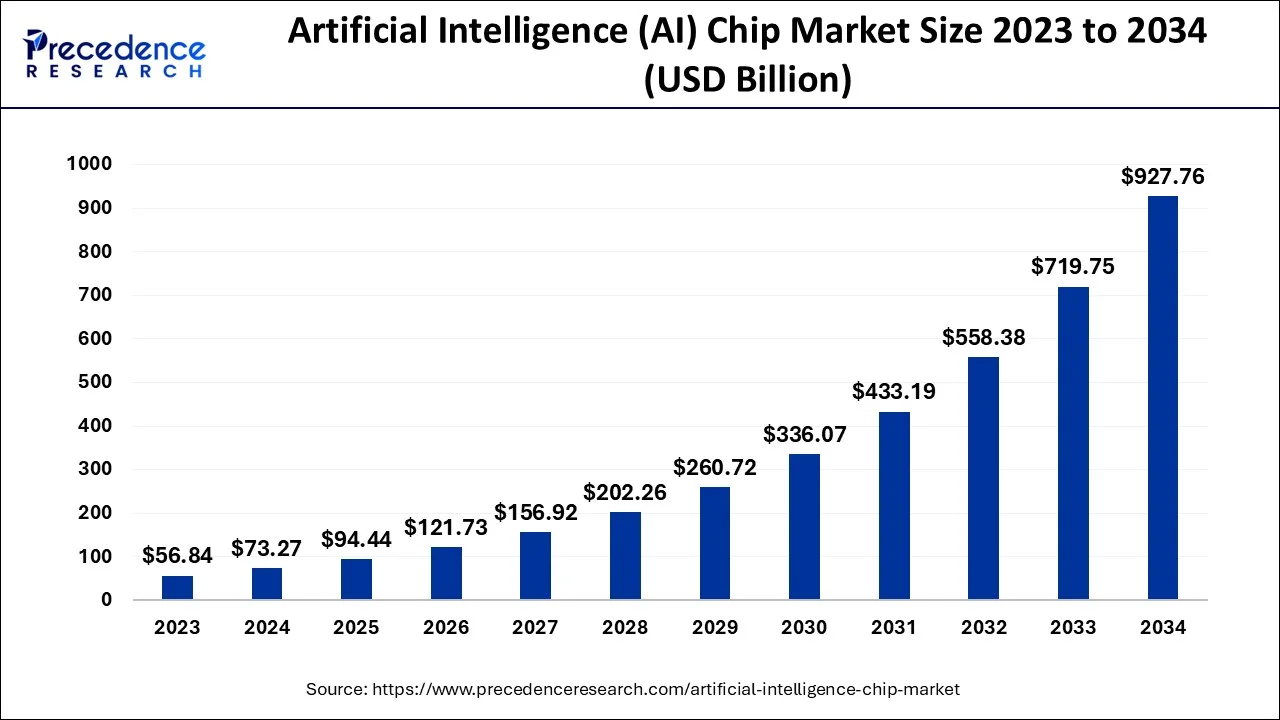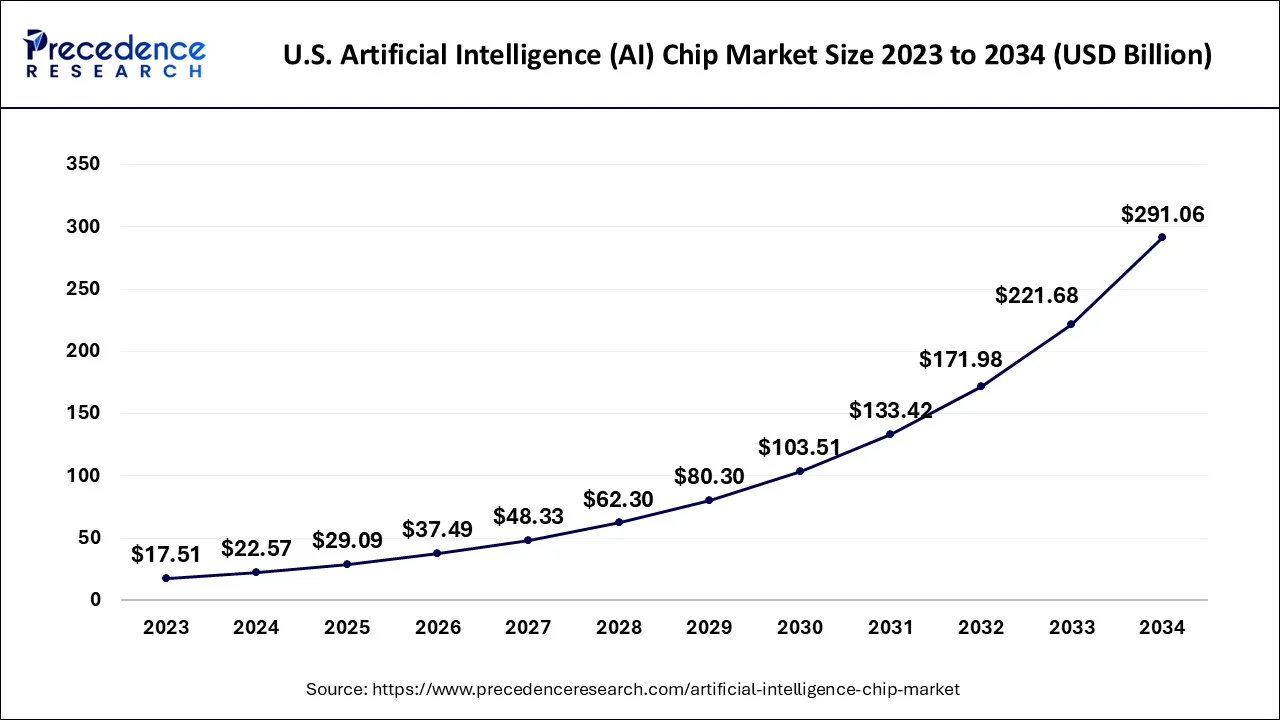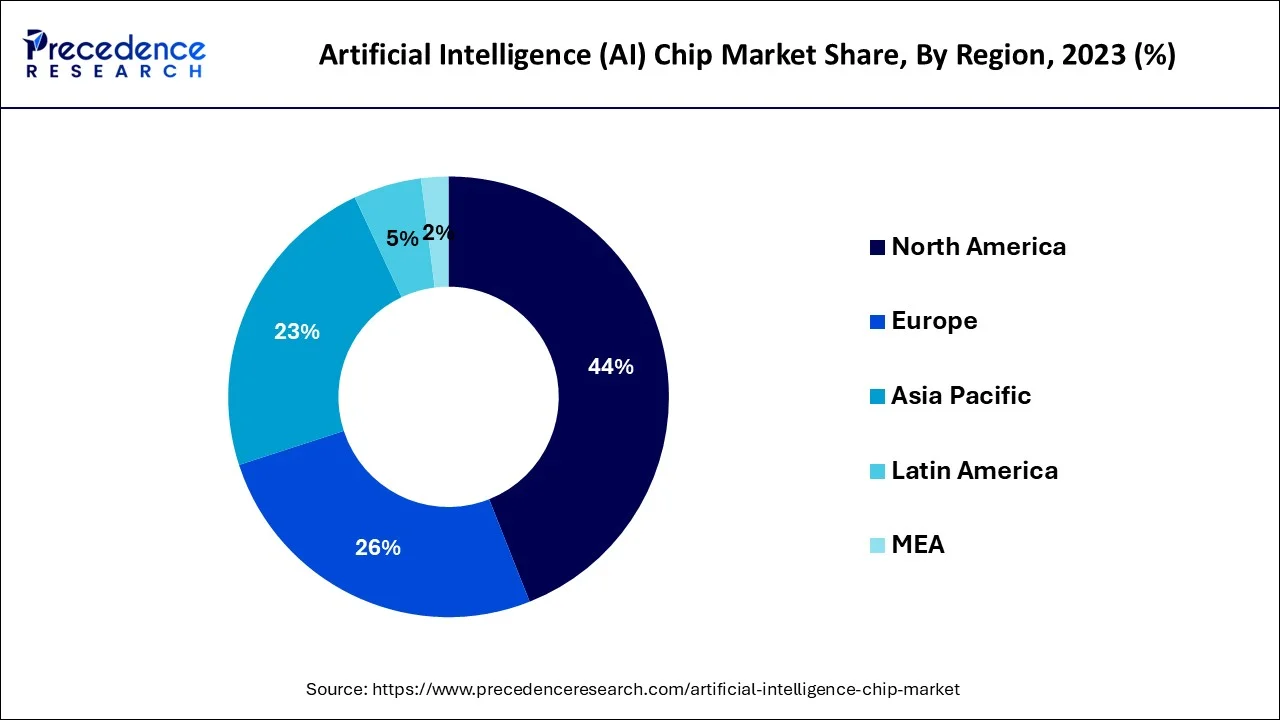What is the Artificial Intelligence (AI) Chip Market Size?
The global artificial intelligence (AI) chip market size was accounted at USD 94.44 billion in 2025 and predicted to increase from USD 121.73 billion in 2026 to approximately USD 1,104.68 billion by 2035, representing a CAGR of 27.88% from 2026 to 2035. Increasing demand for deep learning and deployment of artificial intelligence (AI) in various industries are boosting the growth of the artificial intelligence chip market.

Artificial Intelligence (AI) Chip Market Key Takeaways
- North America region dominated the global market in 2025.
- By technology, the machine learning segment dominates the global market.
- By chip type, the CPU segment is the leading segment of the global market.
- By processing type, the edge segment accounted for more than 75% of the revenue share in 2025.
- By function, the inference segment is growing at a significant rate.
- By end-users, the BFSI segment holds the maximum revenue share and is predicted to maintain growth from 2026 to 2035.
What is an Artificial Intelligence (AI) Chip?
The artificial intelligence (AI) chip is specifically designed to be used in various industries. Such artificial intelligence chips have integrated the acceleration of AI. The rising adoption of artificial intelligence in multiple sectors has forced chipmakers to discover and develop advanced, cheaper, and faster artificial intelligence (AI) chips. Artificial intelligence chips are designed to help enterprises in achieving business insights. Artificial intelligence chips offer better usefulness as compared to other traditional chips. AI chips work more effectively and efficiently by ensuring a better battery life for the device/application.
The artificial intelligence chip consists of networking, computing, and storage. However, the hardware infrastructure of an artificial intelligence chip has been changing continuously with rapid advancements in technology. Chipmakers are focused on developing lighter and smaller AI chips. Artificial intelligence chips perform much faster, which allows devices to perform multiple tasking simultaneously.
Artificial intelligence chips act as semiconductors to minimize human errors. Also, they are capable of completing computational tasks at a faster rate. Companies such as NVIDIA, Intel, Google Alphabet and Advanced Micro Devices have already entered the global artificial intelligence chip market by launching their AI chip models.
Market Outlook
- Industry Growth Overview:
The market has experienced a strong and broad-based expansion mainly because of the advanced computing that supports AI workloads across the whole modern digital world. - Sustainability Trends:
The main concern now is energy-efficient architectures, which reduce the amount of power needed for computation and, at the same time, allow the existence of processing environments that are environmentally friendly. - Global Expansion:
The worldwide demand for the country's own semiconductor production capacity has not only helped to gain independence from foreign chip makers but also to speed up the development of new technologies. - Major Investors:
Sequoia Capital and Intel Capital are the leading investors who are taking steps forward in building up the AI chip ecosystems and backing the disruptive silicon innovation. - Startup Ecosystem:
New companies are presenting creative concepts for AI hardware that are totally different from the conventional semiconductor structures, and they are changing the way of acceleration architectures.
Market Scope
| Report Coverage | Details |
| Market Size in 2025 | USD 94.44 Billion |
| Market Size in 2026 | USD 121.73 Billion |
| Market Size by 2035 | USD 1,104.68 Billion |
| Growth Rate from 2026 to 2035 | CAGR of 27.88% |
| Largest Market | North America |
| Fastest Growing Market | Europe |
| Base Year | 2025 |
| Forecast Period | 2026 to 2035 |
| Segments Covered | By Technology, By Chip Type, By Processing Type, By Function and By End-Users |
| Regions Covered | North America, Europe, Asia-Pacific, Latin America and Middle East & Africa |
Market Dynamics
Many enterprises are shifting towards artificial intelligence to reduce overall operational costs, driving the growth of the artificial intelligence chip market. Increased investment in research and development (R&D) activities for the discovery of advanced AI chips has boosted the growth of the artificial intelligence chip market on a global level.
The demand for quantum computing that is utilized in taking large data sets on operational failures to improve operational efficiency is rapidly emerging. This is considered to drive the market's growth during the forecast period. The demand for systems to manage such data sets has increased with increased big data.
AI chips and applications offer effective management of big data for multiple enterprises. Thus, many developers are focused on producing advanced artificial intelligence chip-based applications. The advancement in technology, including the deployment of robotics in many fields, has propelled the growth of the artificial intelligence chip market.
Artificial intelligence chips are widely utilized in security cameras. The increased demand for surveillance cameras for official, institutional, or home use drives the market's growth. Continuous advancement in the designing of video games has boosted the demand for artificial intelligence-based graphic chips in the market. The surging demand for AI applications from the healthcare and retail sectors to manage big data is one of the major driving factors for the market's growth.
However, the lack of a skilled workforce in the market to successfully implement and manage artificial intelligence systems is seen as a significant restraint to the growth of the artificial intelligence chip market. Lack of awareness about artificial intelligence technology in underdeveloped countries hampers market development. Moreover, the unavailability of high-quality structured data hinders the growth of the artificial intelligence chip market.
The price of AI chips is relatively high, which limits the purchase of AI chip-based applications for small or medium enterprises. This factor is considered a restraint to the growth of the global AI chip market.
Artificial Intelligence (AI) Chip Market Segment Insights
Technology Insights
The global artificial intelligence chip market is segmented into machine learning, natural language processing, context-aware computing, computer vision and predictive analysis. The machine learning segment dominates the global artificial intelligence chip market. The increasing adoption of machine learning by multiple industries and the availability of big data have fueled the growth of the market's machine learning (ML) segment. Machine learning uses statistical techniques to make decisions without any human intervention.
The application of machine learning offers accurate predicting outcomes. The important function of machine learning is fraud and network security threat detection. Prominent enterprises use machine learning to understand consumer interests to provide better service. The machine learning technology segment will acquire the largest revenue share of the market during the forecast period.
Chip Type Insights
The global artificial intelligence chip market is segmented into GPU, ASIC, FPGA, CPU and others. Every AI chip type carries a unique feature and function. The CPU segment is the leading segment in the artificial intelligence chip market. AI Central Processing Unit (CPU) type chips are advanced and can complete the computation faster. GPU holds the second position in the artificial intelligence chip market. graphic processing units (GPUs) are used in refining and developing AI algorithms. The application of AI algorithms in real-time data inputs with field-programmable gate arrays (FPGAs).
Processing Type Insights
The edge processing type segments dominate the AI chip market and generated more than 75% of revenue share in 2025. Edge processing allows computation to be done close to the actual location of data by reducing bandwidth use. The edge processing maximizes operational efficiency and enables the processing of algorithms locally.
However, the cloud processing type segment is expected to witness significant growth during the forecast period in the global artificial intelligence chip market. The development of the cloud segment is attributed to the faster adoption of cloud services in AI, the flexibility provided by cloud processing, and enhanced scalability. The cloud processing segment will be adopted rapidly during the forecast period as it offers more efficient, insight-driven and strategic operations.
Function Insights
The market for the inference function segment is growing at a significant rate. It helps in achieving conclusions from data or evidence. The increasing demand for achieving/deriving data at a faster rate has boosted the growth of the inference segment in the global artificial intelligence (AI) chip market.
End-Users Insights
The BFSI segment holds the largest revenue share and is anticipated to maintain growth during the forecast period. The utilization of AI in the banking sector to reduce the burden and accelerate productivity by decreasing the risk of error has increased in recent years.
Furthermore, the healthcare segment will show the highest revenue share in the global AI chip market during the forecast period. Increasing demand for patient data management and analysis is considered to boost the growth of the healthcare segment.
Artificial intelligence systems offer multiple advantages to the radiology department, and diagnosis and management in the healthcare sector have become easier with the deployment of artificial intelligence. These factors are propelling the growth of the healthcare segment. Moreover, the retail segment is expected to grow during the forecast period.
Artificial Intelligence (AI) Chip Market Regional Insights
The U.S. artificial intelligence (AI) chip market size is estimated at USD 29.09 billion in 2025 and is expected to be worth around USD 347.32 billion by 2035, rising at a CAGR of 29.11% from 2026 to 2035.

North America dominates the global artificial intelligence chip market. The growing deployment of artificial intelligence technology in the IT industry is considered a major driving factor for market growth in North America. The presence of significant technology companies in the US and Canada is propelling the growth of the artificial intelligence chip market in the region. Europe is the fastest-growing region in the global artificial intelligence (AI) chip market.
The growth of the AI chip market in Europe is attributed to the rapid adoption of AI technology in the automotive and healthcare sectors. Germany is the fastest-growing country in the artificial intelligence chip market in Europe.

Asia Pacific is expected to witness significant growth during the forecast period with increasing investment in the software industry. Developing industries in the countries such as India and China are seen as an essential driving factor for the market's growth. China is the major contributor to the artificial intelligence chip market in the Asia Pacific due to the presence of major manufacturers.
The digital transformation in developing countries such as Argentina, Brazil & Mexico is considered to boost the growth of the artificial intelligence chip market in Latin America. The market growth in the Middle East and Africa is still steady. However, the rapid technological changes in developing countries will boost the demand for AI-based chips in these regions.
North America is at the top due to a good IT infrastructure, strong chip designers, and, in addition, the region is supported by the power of venture capital and the focus on high-performance computing, which, in turn, supports the growth of AI silicon and its marketing.
The U.S. is a huge contributor to AI technological innovations, and the entire world follows its R&D efforts, investments in the private sector, and creation of custom ASICs. More data centers plus US-made chips lead to innovative competition and less dependence on standard GPU processing.
The Asia-Pacific region is the fastest-growing growing with sectors of digitalization, semiconductor manufacturing, and government initiatives supporting the use of AI. The industries in the area are determined to have an independent chip manufacturing capability, while the consumer electronics and automotive sectors are driving the need for larger-scale AI hardware tech.
China is putting down large sums of money in AI chip R&D so as to secure enough power to completely rely on its resources in the area. Urban automation and easier access to technology are enabling more consumer electronics companies to develop and maintain a strong protected market footprint in the region.
Digitalization and automation are the main drivers of the various industries in Europe. The new semiconductor technologies will take Europe a step closer to Industry 4.0, robotics, and the production of a sovereign chip, which will all lead to local value creation and technological strength.
Germany is making strides through the high-tech manufacturing and automotive sectors that need AI-based processors for robotics and autonomous systems. Smart factories and ADAS integration are areas where new opportunities are emerging, thanks to chip-making investments that are escalating competitiveness.
Value Chain Analysis of the Artificial Intelligence (AI) Chip Market
- Raw Material Procurement: clearing pure silicon wafers and particular gases forming the limelight of solid and raw inputs for chip fabrication
Key Players: Merck KGaA, Air Liquide - Wafer Fabrication: stacking interconnection of circuits on silicon wafers through multi-step front-end semiconductor manufacturing inside state-of-the-art facilities
Key Players: TSMC, Intel, Samsung Foundry - Photolithography and Etching: using light to transfer patterns and then doing chemical removal of material layers to exactly delineate functional structures
Key Players: Applied Materials and Tokyo Electron - Doping and Layering Processes: advanced deposition of dopants to form electrical traits and component layers necessary for chip operations through layering
Key Players: Applied Materials and Tokyo Electron - Assembly and Packaging: cutting wafers into small pieces, connecting, and protecting chips to be able to be integrated into electronic devices for durability
Key Players: ASE Group, Amkor Technology
Top Companies in the Artificial Intelligence (AI) Chip Market & Their Offerings:
- NVIDIA Corporation: Its GPUs are the most powerful in the world. Its CUDA platform is the most efficient for AI model training and inference.
- Amazon Web Services (AWS): The company is the owner of Trainium and Inferentia, which support the efficient cloud-based training and inference of AI chips.
Other Major Companies
- NVIDIA Corporation
- General Vision Inc.
- Amazon Web Services
- Google Inc.
- Microsoft Corporation
- Advanced Micro Devices Inc.
Recent Developments
- In December 2025, the government launched 'K-Perf 'to certify and verify AI semiconductors' performance. This encourages major companies to adopt domestic chip technologies with clear data.(Source:https://www.chosun.com)
- In November 2025, Google launched Ironwood, its most powerful seventh-generation Tensor Processing Unit (TPU). This reflects years of research and innovation to enhance its leadership in AI infrastructure.(Source:https://etedge-insights.com)
Artificial Intelligence (AI) Chip Market Segments Covered in the Report
By Technology
- Machine learning
- Natural language processing
- Context-aware computing
- Computer vision
- Predictive analysis
By Chip Type
- GPU
- ASIA
- FPGA
- CPU
- Others
By Processing Type
- Edge
- Cloud
By Function
- Training
- Inference
By End-Users
- Manufacturing
- Healthcare
- Automotive
- Agriculture
- Retail
- Human Resources
- Marketing
- BFSI
- Government
- Others
By Geography
- North America
- Europe
- Asia-Pacific
- Latin America
- The Middle East and Africa
For inquiries regarding discounts, bulk purchases, or customization requests, please contact us at sales@precedenceresearch.com
Frequently Asked Questions
Ask For Sample
No cookie-cutter, only authentic analysis – take the 1st step to become a Precedence Research client
 Get a Sample
Get a Sample
 Table Of Content
Table Of Content




 sales@precedenceresearch.com
sales@precedenceresearch.com
 +1 804-441-9344
+1 804-441-9344
 Schedule a Meeting
Schedule a Meeting